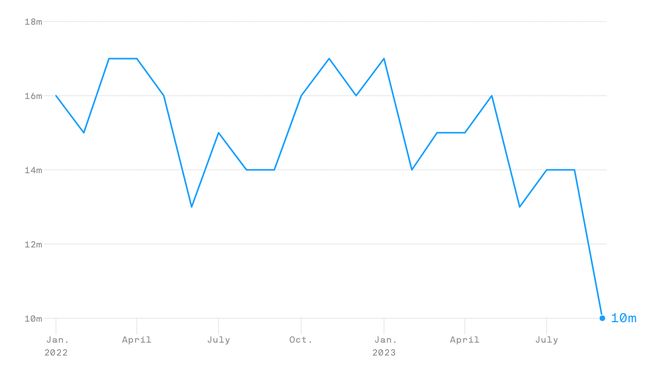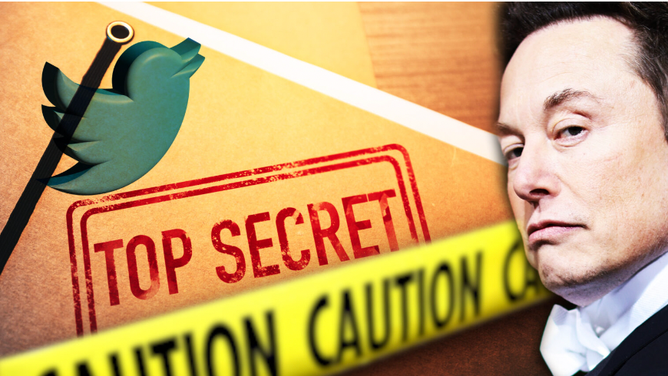Grading Twitter/X After One Year With Elon Musk | Bobby Burack
This Saturday marks one year since Elon Musk purchased X, formerly known as Twitter.
The site has struggled monetarily since his purchase.
Stories from the Wall Street Journal and Axios this week detailed the declines by reporting that U.S. ad revenue was down 60% year-over-year in September.
More specifically, X is on pace to generate $3 billion from advertising revenue this year, down from $4.1 billion in 2022.
Since Musk's purchase, the number of daily active users on the X mobile application has declined by 16%.
App downloads in the U.S. decreased by 57% and 38% globally during the same period.
Axios provided a visual chart of the fall on Thursday:

Declines of that magnitude are never the result of just one reason.
Presumably, some of the more liberal users who vowed to depart the platform upon Musk's plans to decrease censorship followed suit.
The app and site have become increasingly difficult to navigate under Musk's leadership. Load times now lag. Pages regularly crash. In fact, the entire site now crashes.
The idea to sell blue-check marks to any rando on the internet remains questionable.
X introduced a default "For You" tab on the homepage. This tab shows users not whom they follow but whom X wants them to follow.
Previously, Twitter was a hub from where journalists and podcasters drove engagement. Yet the updated algorithm decreases the visibility of outside links to encourage creators to post content directly to the service.
Lastly, Musk made a promise to free-speech absolutists to allow diverse commentators to be seen. This group has voiced its frustrations over his decision to keep the likes of Alex Jones barred from the platform.
Perhaps the grand moment for X came in May when Gov. Ron DeSantis used the platform to announce his 2024 presidential campaign. Critics rightfully labeled the announcement the "Conference Call From Hell" after users tuned in to mere silence to a stream that eventually failed to load entirely.
DeSantis' failed rollout underscores the past year for X: an ambitious plan met with poor execution.
That is not to say Twitter/X is worse off under the ownership of Musk. It isn't. The several series of #TwitterFiles proved Musk couldn't do worse.

Last year, Musk released internal documents through Matt Tabbi and other independent journalists that confirmed suspicions that previous ownership engaged in politically-motivated censorship; took demands from the White House, and shadow-banned high-ranking conservative accounts, like Dan Bongino and Charlie Kirk.
Twitter 1.0 banned accounts at the behest of the Biden Administration. Private companies don't do that. Agents of the government do.
As we detailed at the time, that is a First Amendment concern:
The Biden administration pressured social media platforms to act as a government agency to silence critics of its rule. There’s hard proof of this in the case of former New York Times reporter Alex Berenson over his coverage of Covid-19 and the mRNA vaccine.
The internal communications show a government using a third party to subvert the foundation of the First Amendment. The U.S. government does not have the legal ability to censor the public on its own. So, here is an administration trying to seize unconstitutional power by strong-arming a communication platform beholden to a protection called Section 230 of the Communications Decency Act.
Elsewhere, the documents highlighted how the FBI sent frequent and “fake” warnings to Twitter in October 2020 of an incoming “hack-and-leak” operation that targeted Hunter Biden, to which Twitter used to justify censoring the credibility-reported laptop exposé weeks before his father won the election.
Keep in mind that at least 16 percent of Biden voters say they would have voted differently had Twitter not suppressed the report.
Ultimately, Musk dismantled the unconstitutional dynamic between Twitter and the government. That feat will prove profound during the upcoming 2024 election.
That is a win for democracy and free speech.
However, the win could have been even greater with a more functional service and less manipulated algorithm.
"I love the fact people don’t get banned for saying things that are scientific facts, debate is allowed and videos from war zones can be published so people can see. The long-form video is also incredible," said OutKick writer David Hookstead on the topic.
"Not perfect yet, but a great start. Don’t love the fact there seems to be a high rate of tech issues and he’s scaling up for paid subscriptions to become the norm, but I understand it.
All in, we give Musk a B but remain concerned about the monetary issues that could derail his entire vision.
Let us know in the comment section, or on X, what grade you give Elon Musk after one year.